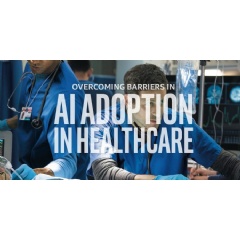U.S. Healthcare Leaders Expect Widespread Adoption of Artificial Intelligence by 2023
Intel Survey Finds Widespread AI Usage in Healthcare is on the Horizon but Trust Remains a Barrier to Adoption
- 37 percent of survey respondents already use artificial intelligence (AI) today, though most to a limited extent
- 54 percent of respondents expect widespread adoption of AI within the next five years
- Respondents see a lack of trust in AI among patients (36 percent) as well as clinicians (30 percent) as barrier to adoption
Today, Intel Corporation revealed the findings from a new study conducted in partnership with Convergys Analytics that surveyed 200 U.S. healthcare decision-makers in April 2018 on their attitudes about artificial intelligence (AI) and perceived barriers to adoption in the industry. AI today is already being applied behind the scenes to detect drug interactions and predict which patients are most at risk for readmissions or experiencing a hospital-acquired condition. We know the promise of AI is much greater: It has the potential to improve clinical effectiveness, reduce cost and increase the quality of patient care.
More: Artificial Intelligence at Intel
The study found that among the respondents whose organizations use AI, clinical use (77 percent) currently outpaces operational (41 percent) and financial use (26 percent). Additionally, the benefits of AI are widely recognized, with 91 percent of respondents believing it will provide predictive analytics for early intervention, 88 percent saying the technology will improve care, and 83 percent saying it will improve accuracy of medical diagnoses. However, trust remains the biggest obstacle to implementing AI in healthcare. More than one-third of those surveyed say patients won’t trust AI to play an active role in their healthcare, and 30 percent assumed that clinicians won’t trust it either – they fear fatal error is the largest barrier to adoption.
To realize the true potential of AI in healthcare, it is imperative that the technology industry work with partners in healthcare to start building trust. During a closed-door workshop at HLTH in May, top experts from across the industry weighed in on ways to do this:
- Addressing the “black box” perception of AI
- Leaning into areas where clinicians are ready for change and fatal error is less likely
- Highlighting benefits for all involved
- Providing input into the regulatory process
“At the end of the day, we are all consumers of healthcare, and we should feel confident that advances in technology can ensure we receive high-quality, affordable care,” said Jennifer Esposito, worldwide general manager of Health and Life Sciences at Intel. “Together, we can ensure patients and providers realize the benefits of AI in healthcare today, building trust and understanding that will help us unlock incredible advances in the future.”
-----
About Intel
Intel (NASDAQ: INTC) expands the boundaries of technology to make the most amazing experiences possible. Information about Intel can be found at newsroom.intel.com and intel.com.
Intel and the Intel logo are trademarks of Intel Corporation in the United States and other countries.
*Other names and brands may be claimed as the property of others.
( Press Release Image: https://photos.webwire.com/prmedia/6/226159/226159-1.jpg )
WebWireID226159
This news content was configured by WebWire editorial staff. Linking is permitted.
News Release Distribution and Press Release Distribution Services Provided by WebWire.
